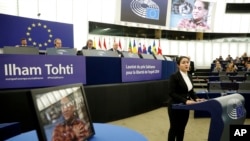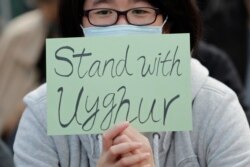Human Rights Watch accuses China of developing a mass surveillance system to monitor and control its population. China figures prominently in the agency’s annual report, which examines the human rights situation in more than 90 countries.
The advocacy group's report says the Chinese people are living through the most intense period of repression since the brutal crackdown on pro-democracy demonstrators in Tiananmen Square in 1989. It says the Uighurs in the northwestern region of Xianjiang province are most victimized. It says more than one million people are interned in so-called re-education camps in an effort to erase their Muslim heritage and culture, a claim China denies.
Human Rights Watch Executive Director Kenneth Roth says China is establishing a surveillance system unlike any ever seen before. He says that system is mostly used to keep tabs on the movements of the Uighurs. He says the system is being developed throughout the country.
This massive database is then used to determine who is detained or not," said Roth. "Police officers on the street have access to this database through their hand-held devices, so people stopped at checkpoints can be sent to detention. And, peoples’ homes actually have bar codes on them, so that police can quickly figure out how reliable the residents in this home are.”
Roth says China censors all criticism at home and is now using its economic power to globalize its censorship system.
He says the government is using its ability to control exports to the Chinese market, which represents 16 percent of the global economy, to get companies abroad to do its bidding.
It has used that threat of denying access to force companies to start to censor their employees," said Roth. "In other words, it has begun to export its censorship system, to move the well-developed domestic system of censorship abroad and to apply it to people anywhere in the world who might criticize China.”
One of the most notorious cases concerns the U.S. National Basketball Association. China threatened to rip up a $1 billion television contract because of a dispute with the NBA over Hong Kong.
Roth says China also uses its influence as a superpower to undermine initiatives it does not like on the diplomatic level. He says China uses its veto power in the United Nations Security Council to stop the U.N. from addressing dire situations in places such as Syria, Myanmar and Venezuela.
He accuses Beijing of doing whatever it can to undermine U.N. efforts to enforce human rights. He says China does respond to pressure. Countries have shown when they band together, they can successfully defy China.
Roth says China cannot retaliate against all countries because it cannot afford to cut off economic relations with the entire world.






